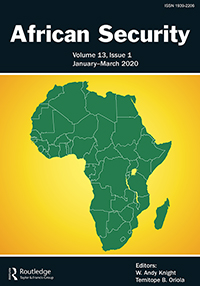Resource information
The recent spate of violence mostly in north-central and southern Nigeria, typically credited to conflicts between herders and farmers, and the reactions, narratives, and representations that have attended them, calls for an examination of core security questions: who or what is to be secured, from what threat and by what means. In fact, it could be further contextualized as: how is the conflict between farmers and herders constructed, framed, and represented as (in)security within the Nigerian context? Several existing works have approached the evolving conflict between pastoralists and farmers in Nigeria from a range of perspectives, mostly accounting for the reasons or causal factors driving such conflicts. This commonly includes references to ecological factors as responsible for the uncontrolled north-south migration of herdsmen which encourages the struggle for – and access to – land and its resources between herders and farmers. At the same time, some studies point to the rise of herdsmen militancy and in doing so draw inconclusive links to other security issues in Nigeria such as terrorism and secessionist movements. However, there have been significant efforts by state officials and interest groups to describe the conflict, either as producing insecurity or to refute such claims of insecurity. This study employs critical constructivism as advanced by Jutta Weldes to examine how the conflict is framed and represented as insecurity. It finds that the discourses produced by the federal and state governments as well as interest groups, constructs it in specific ways by linking specific factors to offer possible explanations of the conflict. As such, the discourses that frame the herder-farmer conflict in Nigeria are: securitization, fulanisation, and sedentarisation. This study presents an important contribution to understanding the framing, constructions, and representations of the herder-farmer conflict in Nigeria.


